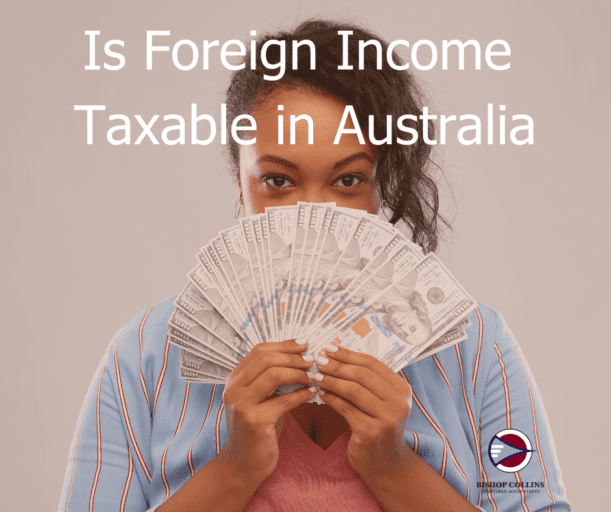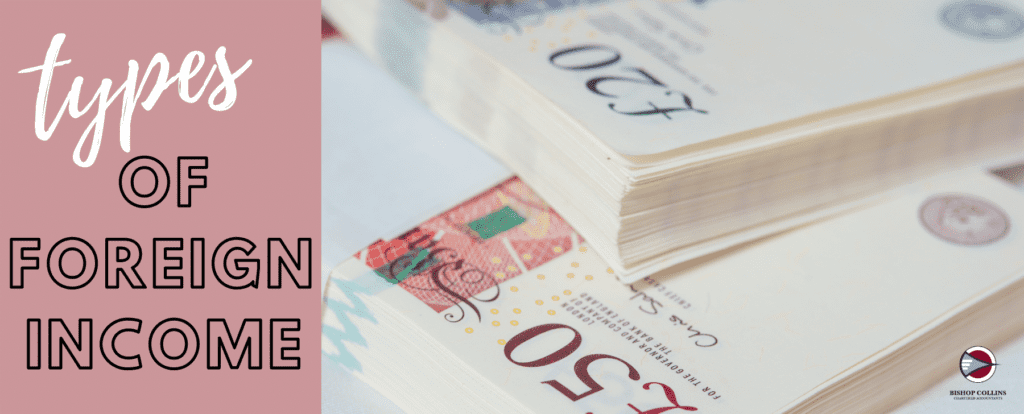
Glenn Harris
Director Bishop Collins
Are you an Australian Tax Resident?
As an individual Australian tax resident, you’re taxed on your worldwide income. YES, all of it!
At the outset, it is important to distinguish if you are an Australian resident for tax purposes, if not you’ll generally only be taxed on income derived or sourced in Australia. The following discussion only applies to Australian tax residents. To determine if you are an Australian tax resident will depend on the circumstances in each case. That is a discussion for another time. In this article, we will discuss some of the important factors you should know about foreign income tax in Australia.
Types of Foreign Income
All your worldwide income must be declared in your annual Australian income tax return. Foreign source taxable income may be derived from a variety of sources and types. For an individual taxpayer, these typically include:
- Employment or personal services
- Pensions and annuities
- Capital Gains and Investment income
Foreign Income from Employment and Personal Services
Income of this nature is generally derived while working for an organisation located outside of Australia and may include salary, wages, directors’ fees, bonuses, share schemes, termination payments, and consulting fees. This foreign income is to be included in your Australian income tax return. The amount to be included should be the gross amount converted to Australian dollars (not the net amount after any tax deducted by your overseas employer). You will likely receive a tax offset for any foreign tax deducted, refer below.
Exempt Foreign Employment Income
Significant changes were made in 2009 limiting what qualifies as exempt foreign employment income. Exempt foreign employment income is now generally limited to where your foreign service is directly attributable to any of the following:
- delivery of Australian official development assistance by your employer (except if your employer is an Australian government agency).
- activities of your employer in operating a public fund declared by the Minister to be a developing country relief fund.
- activities of your employer in operating a public fund established and maintained to provide monetary relief to people in a developed foreign country impacted by a disaster (a public disaster relief fund).
- activities of your employer as a prescribed charitable or religious institution exempt from Australian income tax because it’s located outside Australia, or the institution is pursuing objectives outside Australia.
- deployment outside Australia by an Australian government (or authority) as a member of a disciplined force.
- There are also specific exemptions and special tax treatment for ADF members deployed overseas on special projects and the Australia/United States joint space and defence projects.
Are Foreign Pension and Annuities Taxable in Australia?
Most foreign pensions and annuities received by Australian residents are taxable in Australia. This will even be the case where tax is withheld at the source of the payment. Taxable pensions and annuities include age and superannuation pensions.
If your foreign pension or annuity is paid from a country with which Australia has a tax treaty, you may be able to arrange to not have tax withheld from future payments from that country.
Undeducted Purchase Price (UPP) of a Foreign Pension or Annuity
You may be entitled to claim a deduction to reduce the taxable amount of the pension or annuity income if your pension or annuity has a UPP. The UPP is the amount you contributed towards the purchase price of your pension or annuity and represents a return to you of your personal contributions and will be tax-free.
Is Overseas Investment Income Taxable in Australia?
Investment income may be derived from a wide variety of assets and investments. Any return or income from overseas assets and investments, including overseas bank accounts, must be declared as taxable income in Australia. Examples of these include:
- interest from bank deposits or bonds
- dividends from shares
- royalties from intellectual property
- rental income from real estate
Is Capital Gains Tax Payable on Foreign Assets?
Capital gains tax is usually payable on any gain made on the sale of an overseas asset and will be treated the same way as if you made a gain on an Australian asset.
If you acquired an overseas asset before you became an Australian resident, you are taken to have acquired the asset when you became an Australian resident.
Similarly, if you stop being an Australian resident while holding an overseas asset, you are deemed to have disposed of that asset when you stop being an Australian resident.
Am I Paying Tax Twice on Foreign Income?
You may be concerned your income is subject to double taxation as it was taxed at the source and now it is being taxed again in Australia. To overcome this issue Australia has signed international tax treaties with over 40 countries including all our major trade and investment partners. These tax treaties create a system of credits and exemptions to mitigate or eliminate any double taxation.
Before you claim your foreign tax offset (FTO) you will need to convert the foreign tax paid to Australian dollars. This can be done one of two ways and will depend upon your circumstances. You can use:
- the exchange rate prevailing on a specific transaction date; or
- the average relevant exchange rate.
If you are claiming an FTO greater than $1,000 you will need to first calculate your FTO limit. In effect, this offset is limited to the average rate of tax you will pay on the foreign income in Australia. If your FTO exceeds this amount you will not be entitled to a refund of this excess amount.
Tax Sharing Arrangements on Foreign Income
Pursuant to current tax treaties and information sharing arrangements foreign tax authorities share significant data about income earned by Australian residents in foreign jurisdictions. In addition to this AUSTRAC will share the data reported to it by all organisations with the ATO. Furthermore, the ATO has advised data matching is currently being extensively used in respect of 2020 tax returns for taxpayers. Where errors are detected the ATO will be contacting taxpayers either directly or via their tax agents for a further explanation. Therefore, it’s important you include all assessable foreign source income in your Australian tax return and avoid any penalties or interest occurring should your tax affairs be reviewed by the ATO.
You can find out more about Foreign income tax as an Australian resident by clicking this link. Should you have any questions regarding this please contact Bishop Collins Accountants who can help you take care of all of this.






